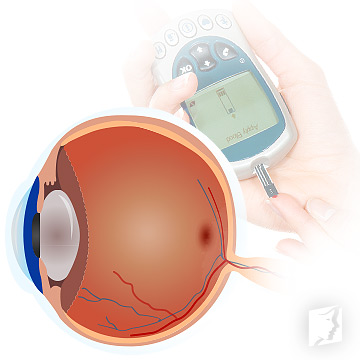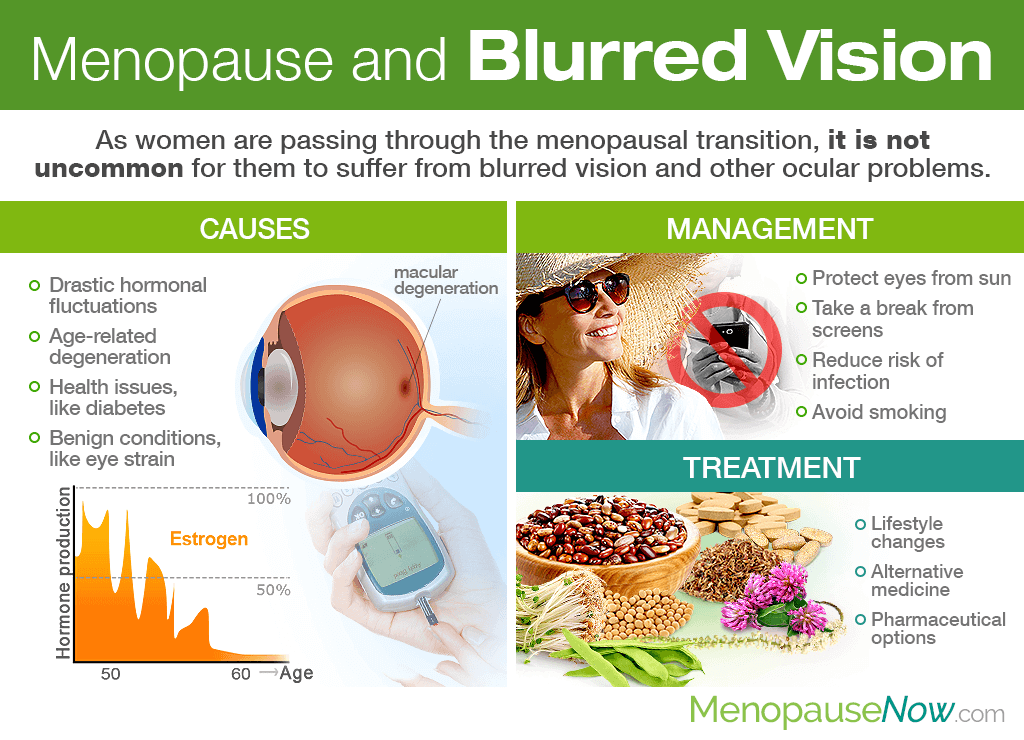Aside from the more traditional menopause symptoms, it is not uncommon for women to be struck with ocular issues as well as they are passing through the menopausal transition. Continue reading to learn more about menopause and blurred vision, including the symptom's causes, management, and treatment options for optimal eye health.
Causes of Blurred Vision during Menopause

As women exit their fertile years, drastic hormonal fluctuations also play a role in blurred vision during perimenopause.
Changing estrogen levels negatively impact oil glands in the eyes as well as the elasticity of the cornea, both of which can affect how light travels into the eye, leading to blurry vision.
It can be accompanied by symptoms of tearing, dry eyes, burning, and light sensitivity.
Blurred vision during menopause may also be due to age-related degeneration or health issues - thyroid disorders, diabetes, glaucoma, stroke, ocular trauma, cataracts, high blood pressure, or hormonal migraines - and other benign conditions, such as over exposure to sunlight, tiredness, or eye strain, among others.
How to Manage It

Perimenopause blurry vision can be efficiently managed depending on the underlying cause, including by:
Protecting your eyes from the sun. Wearing UV protection sunglasses as well as a hat with a brim is essential for avoiding extensive eye damage and possible blurred vision.
Taking a break from screens. Staring at computer screens, televisions, phones, and other electronic devices for extended periods of time can cause excessive strain on the eyes.
Reducing the risk of infection. Women should take care to wash their hands before coming into contact with their eyes, such as when putting on or taking out contact lenses.
Exercising regularly. Exercising 30 minutes a day, five days a week can help women maintain a healthy weight, which not only encourages endocrine system health but also boosts mood and controls blood pressure.
Consuming antioxidants. Lutein, zeaxanthin, zinc, omega-3 fatty acids, and vitamins C and E are essential for preserving vision and reducing the risk of certain eye diseases. Find them in green leafy vegetables, fruits, nuts, fortified cereals, and more.
Avoiding smoking. Smoking can lead to vision loss by increasing the risk of age-related macular degeneration, glaucoma, cataracts, and diabetic retinopathy, all of which can cause blurred vision.
However, effectively managing blurred vision goes beyond the aforementioned tips. If women truly want relief from the harrying symptom, they would do best to treat it.
How to Treat It

Women who are suffering from blurred vision during menopause will find long-lasting relief by addressing the underlying cause, which is often hormonal imbalance.
Menopause symptom treatments that focus on optimal endocrine system health principally start with an optimized diet rich in aforementioned nutrients and phytoestrogens, plant-based estrogens that act as the natural hormone in the body; regular exercise; and healthy habits that include addiction control.
Alongside these measures, women are encouraged to use alternative medicine proven to promote hormonal balance, including phytoestrogenic herbal supplements or hormone-regulating supplements.
Phytoestrogenic herbal supplements, such as black cohosh and red clover, contain stronger concentrations of phytoestrogens, directly combatting an estrogen imbalance that may be at fault for menopause blurred vision. However, use them for short periods of time as the use of exogenous hormones can lead to dependence.
On the other hand, hormone-regulating supplements, like Macafem, work with the body to promote natural hormone production by nourishing the endocrine glands, thus alleviating blurry vision caused by hormonal imbalance as well as other menopause symptoms, like hot flashes and mood swings. Because it does not introduce outside hormones into the body, it is safer for long-term use.
Keep in mind that if blurry vision is, in fact, due to hormonal influences, eyesight should return to normal once levels are balanced.
However, if vision does not improve when measures are taken, it is important to see an ophthalmologist immediately in order to rule out any more serious causes. Treating blurred vision due to other causes could include the use of medications, eye drops, or surgeries.
Key Takeaways
The connection between menopause and blurred vision is often attributable to drastic hormonal fluctuations that take place as women's ovarian functions are coming to a halt. Yet, without a doubt, the symptom can also be from age-related degeneration or a wide array of health issues and other benign conditions. Managing blurry vision includes using proper eye protection, reducing the risk of infection, and avoiding smoking, while treating it for long-term relief focuses on addressing the underlying cause, which is often hormonal imbalance. Alongside lifestyle changes, alternative medicine has also proven resourceful throughout the years.
Sources
- American Academy of Ophthalmology. (2018). How Hormones Can Affect Eyes and Vision. Retrieved August 6, 2019, from https://www.aao.org/eye-health/tips-prevention/how-hormones-can-affect-eyes-vision
- American Optometric Association. (n.d.). Diet & Nutrition. Retrieved August 7, 2019, from https://www.aoa.org/patients-and-public/caring-for-your-vision/diet-and-nutrition
- Centers for Disease Control and Prevention. (2018). Vision Loss, Blindness, and Smoking. Retrieved August 7, 2019, from https://www.cdc.gov/tobacco/campaign/tips/diseases/vision-loss-blindness.html
- Dignity Health. (n.d.). Complete Emergency Care for Blurred Vision. Retrieved August 6, 2019, from https://www.dignityhealth.org/bayarea/services/emergency-services/when-to-go-to-er/blurred-vision
- New York State Department of Health. (2009). Smoking Can Lead to Vision Loss or Blindness. Retrieved August 7, 2019, from https://www.health.ny.gov/prevention/tobacco_control/smoking_can_lead_to_vision_loss_or_blindness.htm
- The North American Menopause Society. (n.d.). Menopause and Eye Health. Retrieved August 6, 2019, from https://www.menopause.org/for-women/menopauseflashes/women%27s-health-and-menopause/menopause-and-eye-health
- Peck, T. et al. (2017). Dry Eye Syndrome in Menopause and Perimenopausal Age Group. Journal of Mid-Life Health, 8(2), 51-54. doi: 10.4103/jmh.JMH_41_17

